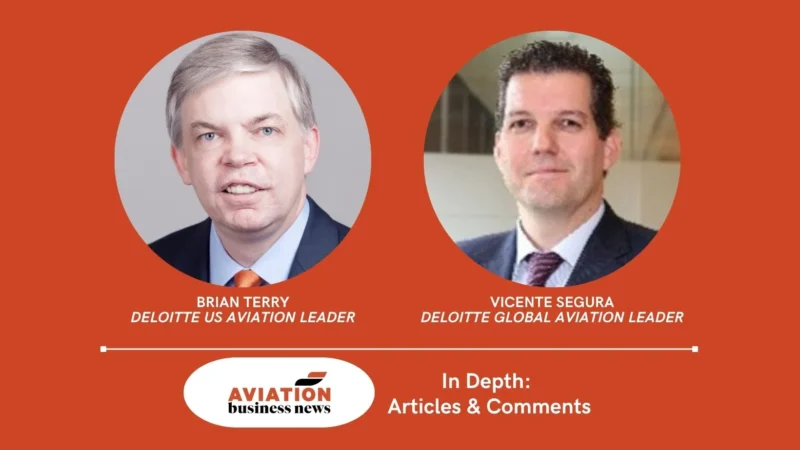Bryan Terry, US aviation leader and Vicente Segura, global aviation leader, for Deloitte take stock on this year’s World Aviation Festival and the findings of its latest airline CEO survey
Despite a backdrop of global headwinds amid the constant push for driving passenger growth, the 2025 World Aviation Festival serves as an indicator of the airline industry’s focus in 2026 and beyond.
Some of the defining conversations that took place over the course of the three-day event focused on how the aviation industry is embracing technology and digital transformation, particularly artificial intelligence (AI), to help strengthen resilience in a volatile world—from examining how AI can enhance the passenger experience to driving efficiency in airline call centres with Agentic AI.
These conversations are reflective of the results in Deloitte’s 2025 Global Airline CEO Survey, which found that while airline CEOs remain concerned about economic and market conditions (50%), geopolitical instability (47%), and supply chain disruptions (40%), their strategic responses are increasingly rooted in technology adoption.
Digital tools are moving from the margins of innovation to the center of core operations, with leaders expecting that smarter systems can enable agility in the face of turbulence.
Getting back to basics—with digital precision
Airlines are doubling down on reliability, with two-thirds of CEOs identifying operational excellence (66%) and cost control and financial health (63%) as their top priorities for the next year. To help drive growth, roughly half of CEOs (47%) cited transformative technology, including AI, as one of their top growth priorities over the next year.
Taking lessons learned from the COVID-19 pandemic recovery and embedding technology into the operational backbone, CEOs are pragmatic about driving digital transformation.
Nearly two-thirds (63%) of CEOs selected advanced data analytics as first among tech investment priorities, making it clear that leadership’s emphasis is on how technology can be a key enabler of basic execution.
AI as an efficiency engine
As airlines zero in on efficiency, AI is rapidly becoming one of the industry’s most powerful levers to help achieve short- and long-term goals. Almost half of CEOs (47%) cited investing in AI as a priority over the next year, and looking to the next three years, many leaders expect AI to have a significant impact on their airline, including:
- Revenue management: Machine learning models can help with pricing, capacity decisions, and revenue forecasting.
- Predictive maintenance: AI-driven analytics can assist airlines with anticipating parts failures, minimizing delays, and extending asset life.
- Customer experience: Chatbots, personalization engines, and disruption-management tools are being integrated to help reduce friction in customer journeys.
For airlines, AI is no longer just about futuristic ambition. It’s about reducing variability, protecting margins, and improving reliability in the here and now.
Workforce and talent strategy – leadership development and better employee experience
While technology has immense potential to transform the airline industry, for many of these organisations, workforce and culture have long been core to competitive advantage.
But in today’s environment, that differentiator is being reasserted—and redefined—as CEOs can prioritize leadership strength, organizational stability, and employee engagement as key levers for resilience and performance.
Employee engagement, experience, and well-being were selected by 47% of CEOs as top workforce initiatives this year.
Combined with leadership development, this reflects a strategic shift: CEOs are investing in not just technology but also its people—not only at the top, but across the frontline.
Operational workforce management transformation is a key component of this investment, accelerating business agility, improving operational efficiency, and elevating frontline employee experience.
Outlook for 2026: Tech-enabled agility
The survey findings and conversations from the World Aviation Festival point to three tech-driven imperatives for the coming year:
- Scaling digital operations
Airlines should expand beyond pilots of AI tools and integrate them enterprise-wide, from maintenance hangars to call centers. The winners in 2026 can be those who standardize digital excellence, not those dabbling in isolated experiments. - Harnessing data for real-time decisioning
With geopolitical and economic uncertainty unlikely to recede, real-time data can become the lifeblood of strategic agility. Airlines that embed analytics into scenario planning could be better positioned to adjust networks, pricing, and capacity at speed. - Building digital trust
Technology adoption should be paired with strong cybersecurity, transparency, and governance. Trust can define competitive differentiation in the next phase of digital aviation, particularly as airlines continue to reimagine their workforce.
